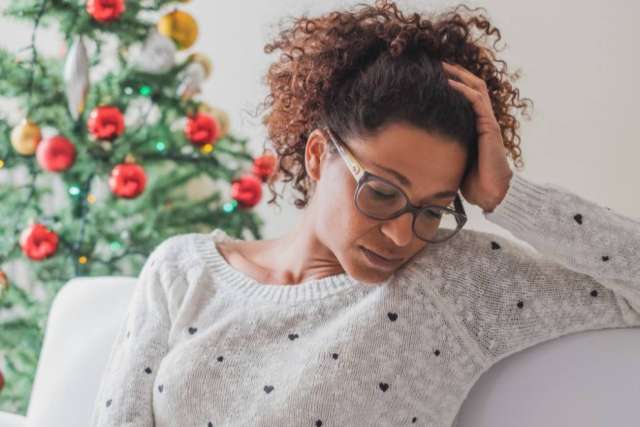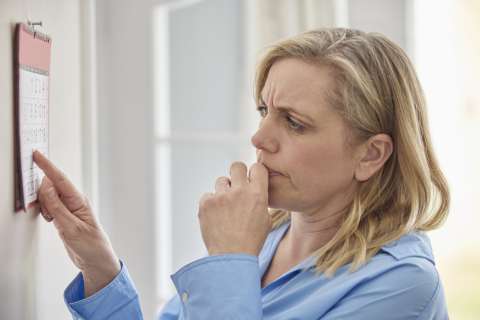If the holidays are “the most wonderful time of the year,” why do so many of us feel stressed out, tired and lonely?
While the holidays are a time of joy and togetherness, the pressures of the season can cause financial and emotional tensions. A survey by the American Psychological Association finds that two-thirds of people in the United States feel some additional stress and fatigue during the holidays.
The holiday blues are a real thing, with the same challenges typically arising every year, says UCLA Health psychologist Emanuel Maidenberg, PhD.
It’s not just the disruption in schedules, with the kids off from school, events to attend and the travel involved in seeing family. It’s also the financial stress of traveling, hosting gatherings and buying gifts. It’s the physiological distress, too, caused by more rich meals, sweets and cocktails than usual.
All of this is compounded by the tendency to compare and despair, as the reality of our families and festivities fail to match the idealized versions on TV and social media.

Set aside comparison
“The way we know about how to think about ourselves socially is by comparing ourselves to other people or to an image of how things should be,” says Dr. Maidenberg, an associate clinical professor with the Jane and Terry Semel Institute for Neuroscience and Human Behavior. “And the image that’s been created of the holiday season is of it being fun, of holiday spirit sprinkled with moments of enjoyment and bliss, and that becomes the standard we tend to compare ourselves to. This becomes potentially quite stressful, because invariably we all go through stressful times and moments during the holidays.”
Because social comparison has historically been important to the formation and self-regulation of social groups, he says, we shouldn’t expect to stop doing it altogether. Rather, Dr. Maidenberg suggests being aware of the tendency to compare and then intentionally focusing on the joy and happy times available to us in our real-life experiences.
“Just being aware of it is a good first step to realize that what thoughts and moments tend to be stressful are when we think about others and compare ourselves to others,” he says. “Whereas, in reality, the most important source of satisfaction we can have is when we compare ourselves to ourselves — so whatever it is we’re able to put together or whatever level of gifts we’re able to provide, recognizing that as our expression of what needs to be expressed.”
Spending more time focused on the enjoyable aspects of the holidays and less on idealized expectations can make a difference in mood, Dr. Maidenberg says.
Anticipate social awkwardness
For most of us, the past two holiday seasons were altered by the COVID-19 pandemic. Maybe we didn’t travel or kept gatherings small — or virtual — in the interest of safety.
With COVID-19 cases down significantly in California from where they were during the 2021 holiday season, this year’s celebrations could look more like old times. But connecting with friends and family members we haven’t seen for a while can cause its own anxiety: What if we’re not as close as we once were? What if we have nothing to talk about?
“Since there were fewer activities, less travel and novelty, it can feel like there’s less to tell” friends and family we haven’t seen, Dr. Maidenberg says.
Anticipating the possibility of social awkwardness, and giving ourselves a break, can make the experience less stressful, he says, as can recognizing the fact that we all experienced the isolation of the pandemic to some extent.
“On the other hand, maybe there will be more excitement and joy in seeing people we want to see and didn’t have a chance to see for a couple of years,” he adds. “So there could be a good side to it, as well.”
Allow the feeling of loss
Even if it’s been many years since a loved one passed away, their absence from holiday traditions can bring about nostalgia and even painful memories, he adds.
“It can be a source of sadness, and missing this person could feel stressful,” he says. “But if we accept it and feel it and stay with it, it becomes part of the experience of letting go.”
Maintain schedules and self-care routines
One reason the holiday season feels stressful is because it disrupts our ordinary schedules. Added activities – from socializing to traveling -- change the way we usually eat, sleep and move.
“We typically do much better with structured life and predictable activities,” Dr. Maidenberg says.
He advises sticking to a regular sleep schedule and maintaining exercise routines as much as possible.
“The simplest, most important thing is to get up at the same time as you do when you work and continue doing as many activities in that sequence that you typically do,” he says.
Waking up at a regular time improves sleep quality, Dr. Maidenberg says, because it helps us stick to a more regular bedtime.
Getting some exercise, even if it’s not your typical routine at your regular gym, can also help reduce stress and keep indulgent eating and drinking in check.
Consider upholding these routines as essential self-care for the season, Dr. Maidenberg says.
“When there is more distress, we tend to give up on self-care,” he says. “Which is exactly the time that we need it.”
Learn how to reduce your risk of spreading or contracting COVID-19 at holiday gatherings.




